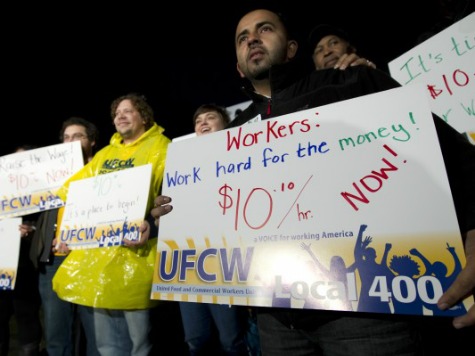
On Monday, Minnesota and Maryland joined 21 other states in setting their states’ minimum wages well above the federal rate.
By 2016, Minnesota’s minimum wage will climb to $9.50. By 2018, Maryland’s minimum wage will reach $10.10 an hour.
Vulnerable Democrats had hoped pushing a minimum wage hike would be a silver bullet in the upcoming Nov. 4 elections. However, the wage hikes may dampen Democratic plans by muting the relevance of the issue altogether. Still, President Barack Obama continues to push a $10.10 minimum wage in the hopes of stirring support among his disheartened Democratic base.
“It’s time to give America a raise!” Obama said in his State of the Union and in several speeches since.
According to the U.S. Department of Labor, however, only 2.8% of Americans earn at or below the minimum wage. Moreover, half of all minimum wage workers are 16 to 24 years old–many of whom are high school and college students earning extra money while in school.
Still, the fact that 97.2% of Americans earn above the minimum wage has not deterred Democrats from hoping the issue will spare them the electoral tsunami political analysts say they could face in the midterm elections. The GOP says Obama’s use of the minimum wage issue is evidence the president is “waving the white flag of surrender” over his failed economic policies.
Even Obama’s former chairwoman of the Council of Economic Advisers Christina Romer has questioned the usefulness of raising the minimum wage. “Economic analysis raises questions about whether a higher minimum wage will achieve better outcomes for the economy and reduce poverty.” Romer adds that, “most economists prefer other ways to help low-income families.”
Political analysts say Republicans have a better than even chance of regaining the Senate; none predict the GOP will lose the House.
Voters head to the polls in 211 days.

COMMENTS
Please let us know if you're having issues with commenting.